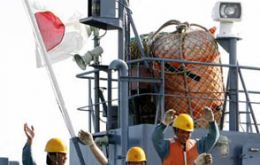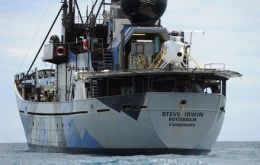MercoPress. South Atlantic News Agency
Tag: Japanese whalers
-
Monday, March 28th 2016 - 05:55 UTC
Japan announces it has harpooned 333 whales in Antarctic waters; conservationists outraged

The Institute for Cetacean Research (ICR), the body behind the Japanese government’s whaling program, announced the return of the Japanese whaling fleet from its Antarctic operations. It is the first time that the Japanese whalers have returned to the Southern Ocean to slaughter whales since the International Court of Justice (ICJ) ruled its whaling program to be illegal in 2014.
-
Wednesday, November 19th 2014 - 07:51 UTC
Greenpeace condemns Japan’s rush to resume Antarctic whaling

Greenpeace on Tuesday condemned the Government of Japan's rush to resume Antarctic whaling and called on them to abide by world opinion and the clearly expressed desires of the International Whaling Commission (IWC).
-
Friday, September 19th 2014 - 06:58 UTC
Tougher scrutiny of Japanese bids to kill whales for “scientific research”

Nations agreed on measures Thursday to toughen scrutiny of future Japanese bids to kill whales in the name of scientific research, which critics say is a cover for commercial hunts.
-
Monday, March 31st 2014 - 16:29 UTC
Japan abides International Court of Justice ruling to halt whaling program

The UN's International Court of Justice (ICJ) has ruled that Japan must temporarily halt its whaling program in the Antarctic. It agreed with Australia, which brought the case in May 2010, that the program was not for scientific research as claimed by Tokyo.
-
Wednesday, February 27th 2013 - 05:44 UTC
Fisheries minister says Japan will never stop hunting whales “it’s part of our culture”

Japan's fisheries minister said Tuesday his country will never stop hunting whales, despite fierce criticism from other nations and violent clashes at sea with militant conservationists.
-
Wednesday, December 19th 2012 - 20:12 UTC
US court tells Sea Shepherd to stay away from Japan’s whaling fleet in Southern Ocean

US court has ordered conservation group Sea Shepherd to stay at least 500 yards away from Japan's whaling fleet in the Southern Ocean. The US Court of Appeals for the Ninth Circuit banned the group from “physically attacking any vessel engaged by the plaintiffs”.
-
Wednesday, July 4th 2012 - 22:13 UTC
South Korea announces plans to start whaling for “scientific research”

South Korea said on Wednesday that it planned to start whaling through a loophole that allows the killing of whales for scientific research, following the lead of Japan's controversial expeditions.
-
Friday, January 6th 2012 - 07:12 UTC
“Ninja” patrol vessel joins the annual Antarctic dispute with Japanese whalers

The Sea Shepherd flagship ‘Steve Irwin’ was shadowed by a Japanese security vessel as it escorted the badly damaged Brigitte Bardot to Fremantle for repairs, the anti-whaling group says.
